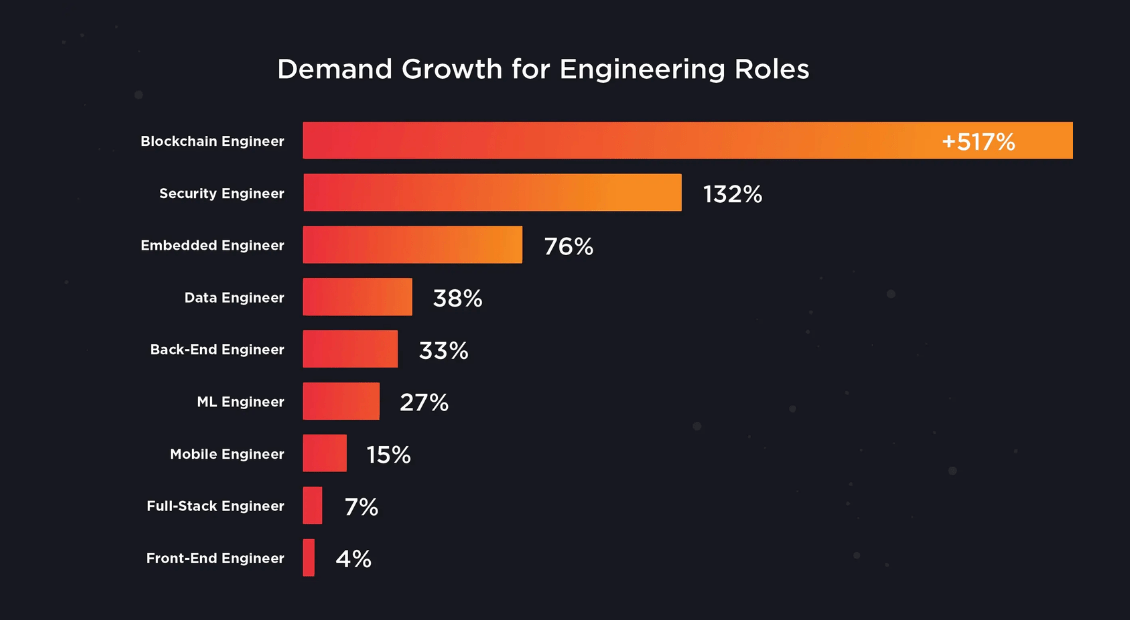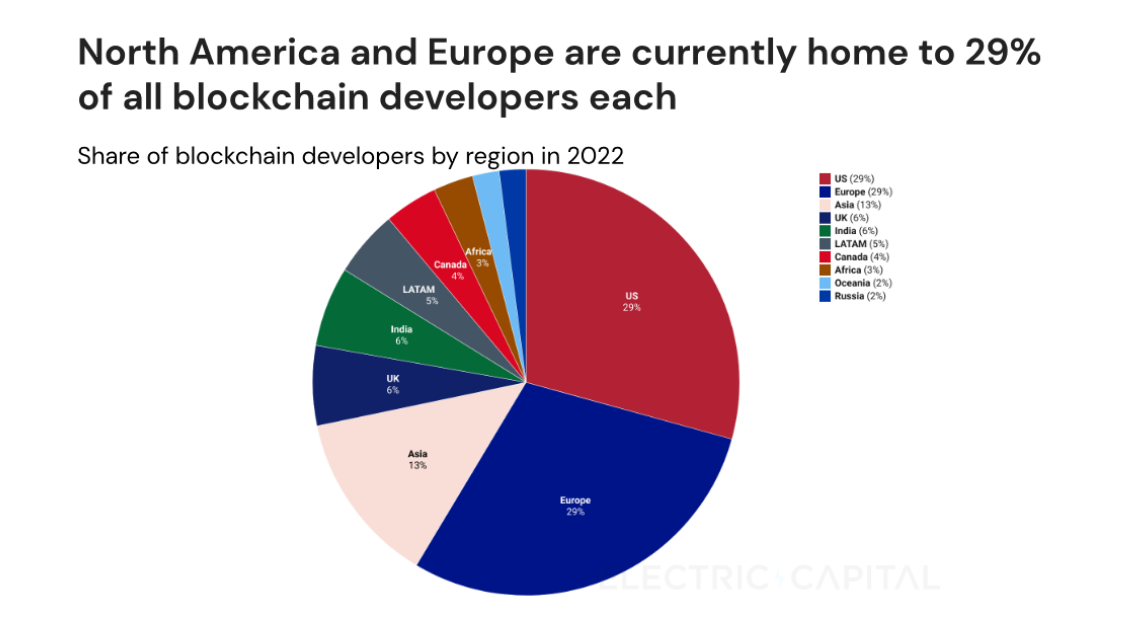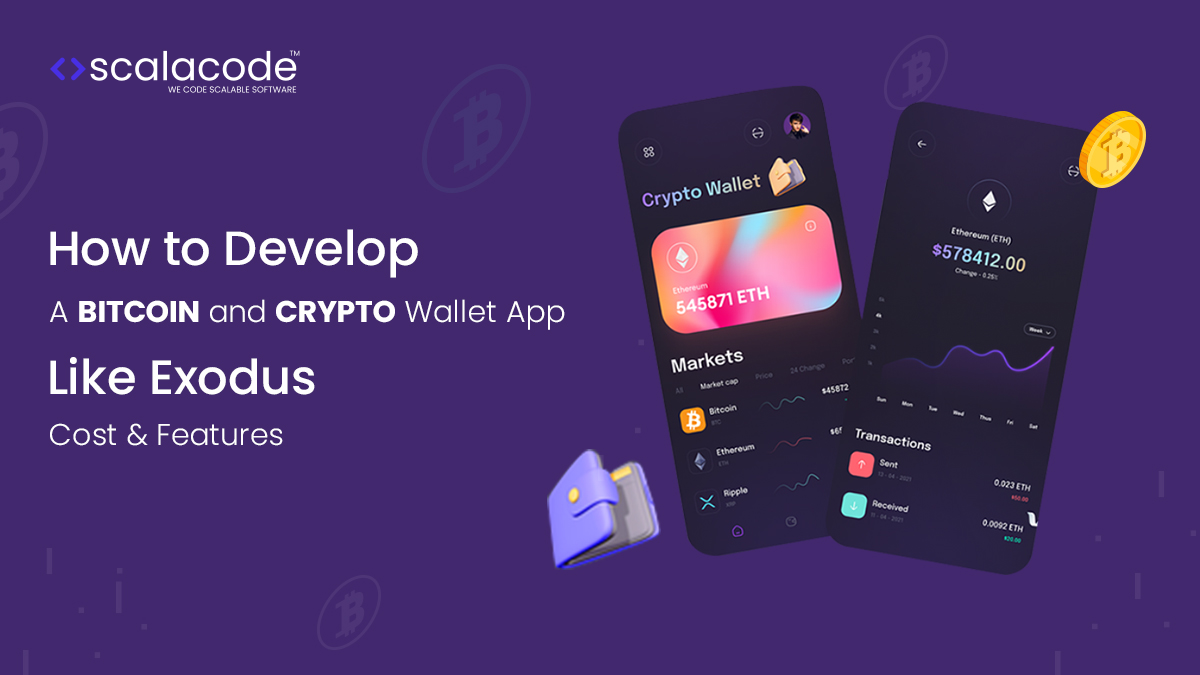We have written this article to help you understand- who are blockchain developers, and the pros and cons of hiring them remotely. Also, we will discuss what are the best practices to hire blockchain developers either remotely or on-site.
Since Bitcoin was launched in 2009, there has been hype about blockchain technology. People actually started to wonder what it was and how they could leverage it to meet their business objectives.
While there have been so many changes going around the IT sector, two of the capturing trends took center stage:
- The migration of businesses into the world of Web3.
- And the adoption of a remote work culture.
Many companies are impressed by the powerful promises of blockchain – decentralization, immutability, and transparency it offers.
But as the excitement mounts, so does the demand for a unique group of tech professionals – blockchain developers. In just a year, the hunt for software engineers skilled in blockchain has increased by a whopping 517%.

Now, pause for a minute. Do you remember the unexpected COVID-19 outbreak? Well, it was the time that let remote work right into the spotlight.
As per Upwork’s Future Workforce Pulse: 36.2 million Americans are expected to work remotely by 2025, marking an 87% increase from pre-pandemic times.
But, should you too hire remote blockchain developers? If Yes; what benefits does this hiring model bring? Is there any disadvantage where they might not be ideal preferences?
Well, for both questions, the answer is ‘Yes’. We do have pros and cons of hiring remote blockchain developers. And, as business leaders, it’s our responsibility to weigh both sides of the coin i.e. remote hiring for blockchain developers to make a wise decision.
Let’s give a quick insight into them, but first, learn – who are remote blockchain developers.
Remote Blochian Developers – Who Are They?
With so many terms floating around to hire blockchain developers like remote, dedicated, on-demand, etc. it can be confusing at some point- which term should I use when looking to hire a blockchain developer?
Defining remote blockchain developers is quite interesting. Essentially, they are those talented individuals who work on your blockchain-based project, but from the comfort of their own chosen space. It could literally be any corner of the world.
And, if you ask who are blockchain developers? They’re genius software engineers who have a deep understanding of the ins and outs of blockchain technology.
Besides, they can do any sort of task related to this technology. For example-
- Developing blockchain protocols
- Developing decentralized apps (dApps).
- Optimizing blockchain code
- Crafting the architecture of blockchain systems
- Creating smart contracts
Furthermore, any developer who is involved in the development of blockchain technology and they are physically away from the central office or team location can be considered a remote blockchain developer.
Remote Hiring For Blockchain Developers – List of Pros
When you hire dedicated blockchain developers to work remotely on your project, you can enjoy several benefits. Let’s take a look at some of them:
-
Access to the world’s greatest talent
When you’re on a mission to scale up your engineering team, why box yourself into the limits of local talent? Yes, remote hiring for blockchain developers shatters those boundaries and gives you the handful of benefits to tap into a global pool of talents.
Whether it’s an expert developer in the core of the tech world like India or an impressive coding specialist in a remote European town, the global population has a plethora of undiscovered skills and talent.
However, statistics from the tech industry show that North America and Europe share a collective 29% of crypto developers, with Asia following close behind at 13%.

Hence, companies now have an amazing opportunity to connect with top-tier blockchain developers who come equipped with:
- technical expertise
- industry knowledge
- problem-solving skills
-
Reduced Cost
Traditional hiring practices often entail substantial relocation costs for both the company and the employee. Remote hiring of blockchain developers eradicates these expenses, allowing you to allocate resources more strategically.
This can be particularly advantageous for startups and smaller companies looking to make the most of their budget. Here’s how remote hiring helps in reducing costs:
- Lower Office Expenses: With remote developers, you can downsize office space or even operate without a physical office altogether. This cuts down on rent, utilities, office supplies, and maintenance costs.
- Savings on Benefits and Perks: Remote developers might not require the same level of in-person benefits and perks as on-site employees. This can lead to savings on health insurance, commuter benefits, free meals, and other office-related perks.
- Tax Benefits: Depending on the region, there might be tax incentives or benefits associated with hiring remote workers. This could include reduced taxes or exemptions, which can contribute to overall cost savings.
This approach offers a win-win situation, enabling companies to access top talent while maintaining a leaner and more cost-effective operational model.
-
On-Demand Expertise:
Not every job needs a full-time worker. Suppose you’re working on a special project like creating NFTs (cool digital collectibles), and you need skilled people who know about blockchains (the tech behind NFTs).
Instead of hiring someone to work all the time, you can hire remote blockchain developers just for your project. It’s like borrowing their special skills when you need them.
This way, you get the right people for your NFT project without spending a lot of money on a full-time employee. You’re like a smart shopper, using expert help only when necessary.
-
Enhances your DEI strategy
Remote hiring for blockchain developers is more than a workaround – it’s a gateway to diversity. When there are no borders, the limits are removed, and talents from diverse backgrounds across the globe can be tapped into.
Envision a team of diverse individuals, each contributing their distinct flavor, resulting in a concoction of creativity. Diverse teams don’t just solve – they excel, thanks to fresh angles and ideas. This isn’t a checkbox move; it’s a strategic one. It’s understanding markets before they’re markets, and foreseeing trends before they trend.
In this borderless hiring landscape, it’s your skills that matter, not your location. Degrees and innovation outweigh commutes. Going remote for blockchain isn’t just keeping up; it’s leaping forward.
-
Faster response time
When you have a team that is basically up and running 24*7, you can easily speed up your productivity and deliver a result that is optimal.
If you want to implement such a team in your organization, then hiring remote blockchain developers is your answer. With remote teams, it is way easy to execute and implement on rotating hours given the different time zones. With such constant availability, you’ll be able to address any issues or errors anytime.
Remote Hiring For Blockchain Developers – List of Cons
Naturally, every journey comes with its share of hurdles. That’s why it’s crucial to weigh the downsides before leaping into decisions and figuring out if there’s a workaround. Here’s a rundown of drawbacks that accompany the hiring of remote blockchain developers:
-
Inconsistent schedules due to time zone differences
When you’ve got remote blockchain developers in different time zones, things can get tricky. Waiting hours for help or answers can slow things down. But here’s a fix: try Agile methodology.
Set up a schedule that suits everyone, lay out how you’ll talk stay updated, and track progress. With this, you’re not just handling time zones – you’re keeping your blockchain projects on point and moving forward.
-
Mismatched expectations due to a lack of communication
When you are working with remote blockchain developers, nailing communication is a must. It’s just the key to success. Without it, projects stumble, quality falters, and frustration grows.
The fix?
Put in the effort. Use tools like Microsoft Teams or Slack for messaging, and keep the connection alive with Zoom or Google Meet for face-to-face talks. When communication flows, so does the success of your blockchain ventures.
-
Working with remote blockchain developers can be challenging
Getting the best from your remote blockchain developers boils down to having the right managerial mindset. One of the big reasons some leaders hesitate about remote hiring is trust. They’re concerned that remote blockchain developers might misuse their freedom and not meet their responsibilities.
What to do to handle it?
Tech tools. Go for employee tracking tools like Hubstaff, and Trello to set up to track progress. Set up regular check-ins for feedback and solutions. Instead of assuming, let results prove the deal. Trust, boosted by tech, keeps your remote blockchain team on course.
The Best Practice To Hire Remote Blockchain Developers
If this is your first time diving into hiring remote blockchain developers, a little guidance goes a long way. Here are top-notch practices to help you hit the mark:
- Build a Job Post
Start initially with having the right job post. Attracting suitable applicants for remote blockchain developer positions can hinge on this factor. Make sure you do the following when curating a job post for a blockchain developer:
- Company Mission: Clearly state your company’s mission and purpose.
- Problem to Solve: Define the challenge you’re tackling.
- Skills Needed: Specify required skill sets.
- Experience Required: Mention the level of experience needed.
- Extra Requirements and Benefits: List any added expectations or perks.
- Team Fit: Explain how they’ll gel with the team.
- Role Breakdown: Outline their main responsibilities.
With this roadmap, you’ll draw in the right blockchain talents.
- Prepare Interview Questions
Interviewing the right way is as crucial as the job post. Tailor your questions to the blockchain developer’s skills and background. Also, confirm that your questions do resonate with your company’s vibe.
We know interviews aren’t just about skills. They’re a peek into how well you’ll work together. It’s a two-way street; candidates should feel your warmth too.
Here are some questions that could fit the bill:
- Blockchain Experience: How long have you been in the blockchain world?
- Challenges Perspective: What hurdles do you see in adopting or using blockchain tech?
- Project Showdown: Ever made a blockchain app? Tell us about it.
- Cryptography Connection: Your experience with cryptography and how it matches blockchain work?
- Coding Know-How: Any Solidity or other blockchain language coding?
- Crypto Savvy: Thoughts on Bitcoin and cryptocurrencies?
- Project Tools: What tools manage your projects?
These questions do more than just dig into skills – they show your openness as a future boss. It’s the chemistry check for a rock-solid team.
- Put Them to the Test
A challenge is grasping what makes blockchain special. It’s about knowing its main parts: not controlled by one, safe, unchangeable, agreed upon by all, and open to everyone. You see this in things like smart contracts and cryptocurrencies like Bitcoin.
When hiring remote blockchain coders, ensure they’re on board with this. Check their openness to learning. Also, set up coding tests. These tests check how well they get blockchain tech and handle it.
Tasks like crafting a simple smart contract, managing transactions, or solving blockchain glitches. These tests size up their skills and how good they are in blockchain work.
Also read: The Future of Blockchain and AI Collaboration
Parting Words
The pluses are clear: flexibility, worldwide talent, and unleashed innovation. But, the challenges! Remote teamwork’s tune isn’t always smooth. Miscommunications and uncertainty can shadow the path.
At this crossroads, it’s about blending blockchain’s potential with the remote’s changing beat. It’s about picking the perfect minds to shape your Web3 aspirations. Hire dedicated blockchain developers from ScalaCode to ensure success. We provide remote blockchain developers who are skilled in a range of blockchain technologies such as Ethereum, Hyperledger, and Corda.
FAQs
Q1: What skills to check while hiring remote blockchain developers?
Ans. Seeking a skilled Blockchain developer? Focus on these core skills:
Data Structures and Blockchain Fundamentals: Look for a grasp of data structures and Blockchain basics like consensus mechanisms and smart contracts.
Platform Proficiency: Prioritize familiarity with platforms like Hyperledger Fabric, Ethereum, or Corda.
Web Development Savviness: Ensure expertise in HTML, CSS, JavaScript, PHP, and UI/UX. A blend of coding and user-friendly design is gold.
Q2: Where to find dedicated blockchain developers?
Ans. Here’s where to scout to hire dedicated blockchain developers:
- Blockchain Job Boards: Check Crypto.jobs, CryptoJobsList, and CryptoCurrencyJobs.co for a wide talent pool categorized by skills and location.
- Online Communities: Platforms like Reddit, BitcoinTalk, and StackExchange connect you directly with blockchain experts seeking new opportunities.
- Conferences: Attend Bitcoin Miami, Blockchain Expo, North American Bitcoin Conference, or LA Blockchain Summit to network and hire.
- GitHub: Explore open-source projects by blockchain developers on GitHub, showcasing their skills and code.
- Software Development Company: Use platforms like ScalaCode to find vetted remote blockchain engineers ready for action.
Expand your search horizon for the perfect blockchain fit.





